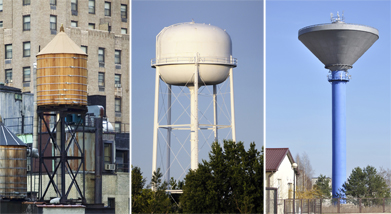Lesson 4
1. Lesson 4
Module 7: Volume and Capacity
Lesson 4: Applying Volume and Capacity Formulas
Focus
People wouldn’t survive without water. Water tanks are used around the world to store water and help create enough pressure to move the liquid to each person in the system. As you can see from the photos, water towers can come in a variety of different shapes. Can you identify any cylinders, cones, or spheres in the towers pictured?
Most objects are not pure spheres, pyramids, cones, cylinders, or prisms. Instead, objects are often combinations of many shapes. In this lesson you will apply volume and capacity formulas to a variety of practical problems, including composite figures.

cylinder tower: Comstock/Thinkstock; round tower: iStockphoto/Thinkstock; cone tower: iStockphoto/Thinkstock
Lesson Questions
In this lesson you will investigate the following questions:
- How are volume and capacity formulas applied to problems involving composite figures?
- How is formula manipulation used to find unknown dimensions?
Assessment
Your assessment for this lesson may include a combination of the following:
- course folder submissions from the Try This and Share sections of the lesson
- your contribution to the Mathematics 20-3 Glossary Terms
- Lesson 4 Assignment (Save a copy of your lesson assignment to your course folder now.)
- the Project Connection
Materials and Equipment
- calculator